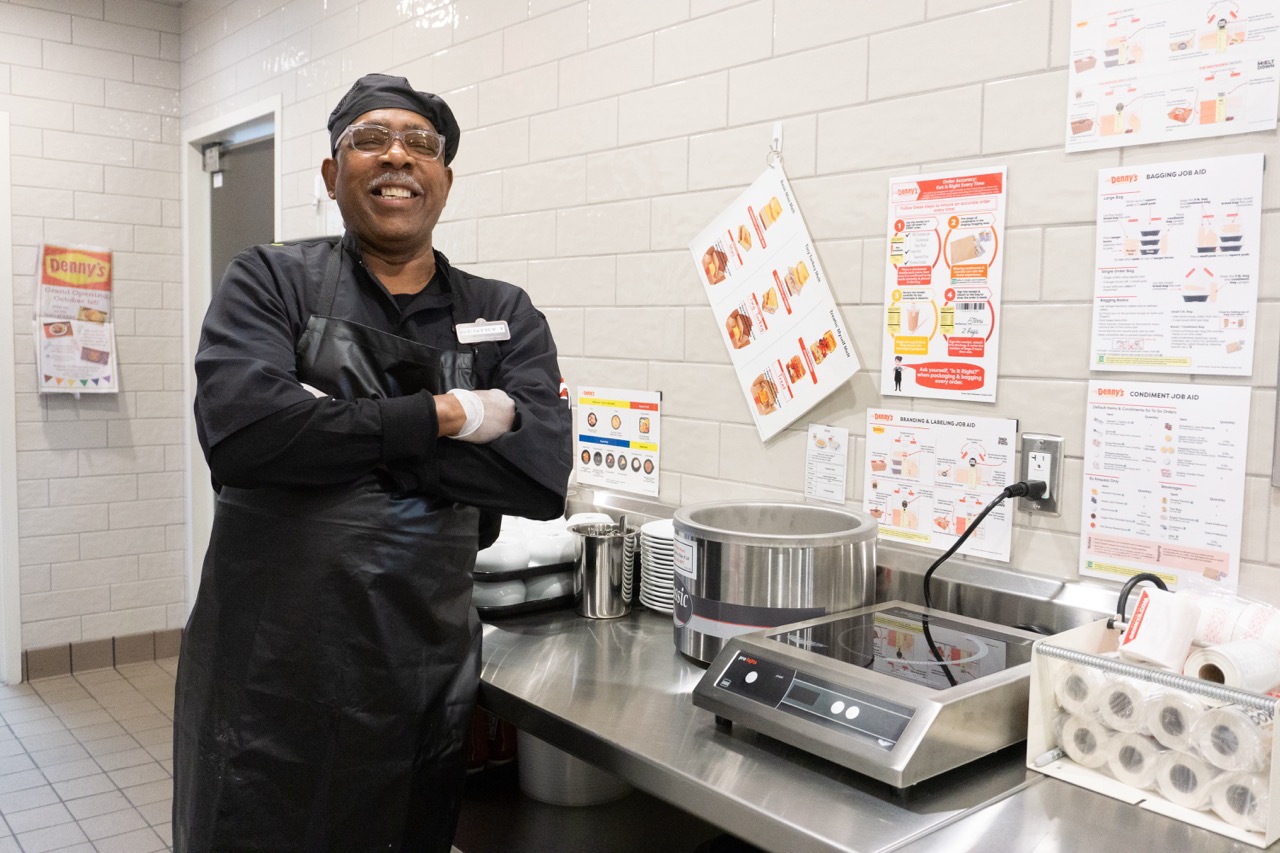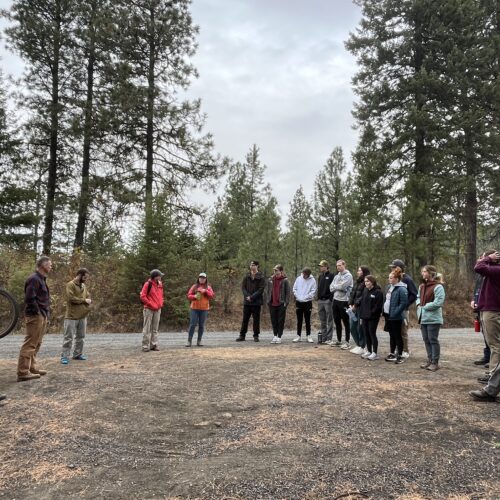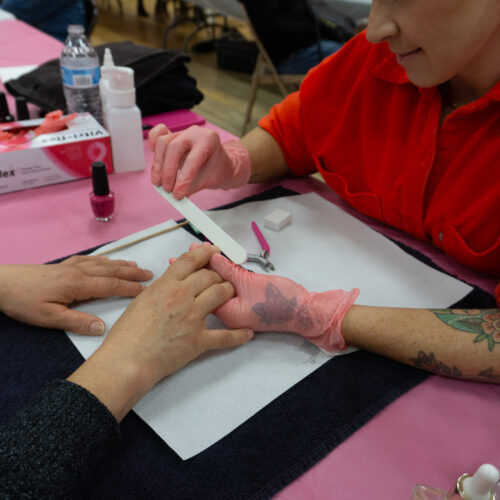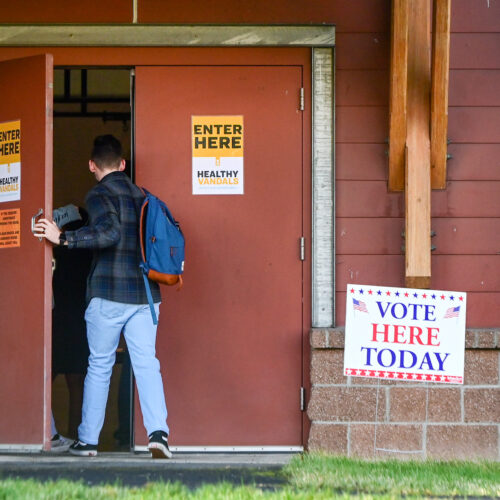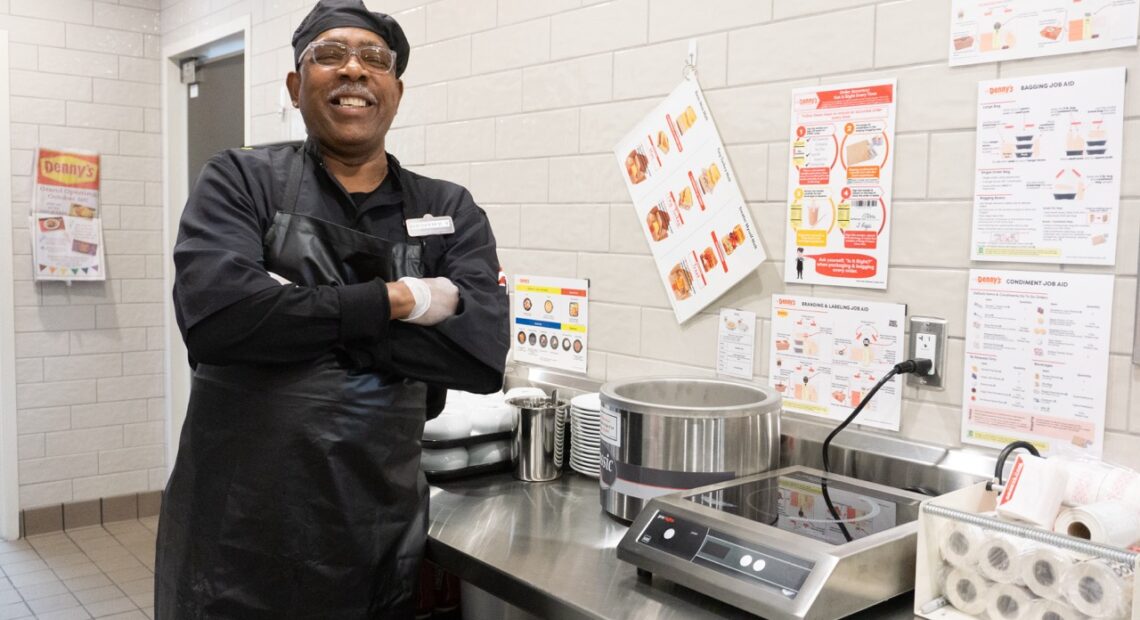
Walla Walla got a Denny’s. Some of its staffers got second chances
Listen
(Runtime 3:41)
Read
It was 30 minutes after the new Denny’s in Walla Walla had opened its doors: The coffee was hot, the syrup was sticky and the booths were full.
On the line, frying up Grand Slams, was Gentry Thorpe. He was convicted of a felony around 25 years ago. When he qualified for work release, he became a cook at a Denny’s in Georgia. He continued working for the chain after he got out.
“It’s like they saw potential in me that I didn’t know I had,” he said.
Thorpe, now 68, eventually got a job on the railroad. He worked there for two decades, then moved to Walla Walla to be closer to his two sons and eight grandchildren. But retirement didn’t really suit him.
“I got tired of sitting, I got tired of looking at the wife,” he joked. “So I started looking for some work to do.”
Thorpe hadn’t gone job hunting in forever, and old feelings soon bubbled up. “You have that fear, you know,” he said. “I wonder if I’m gonna get hired because of the fact that I got a felony after all that time.”
When Thorpe went to the local branch of WorkSource, a statewide agency for job seekers, one of the fliers stood out.
“All the other paperwork that they had in front of me for jobs, I just pushed it aside and said, ‘I want this one,’” he said. “Because I knew Denny’s gives people a second chance.”
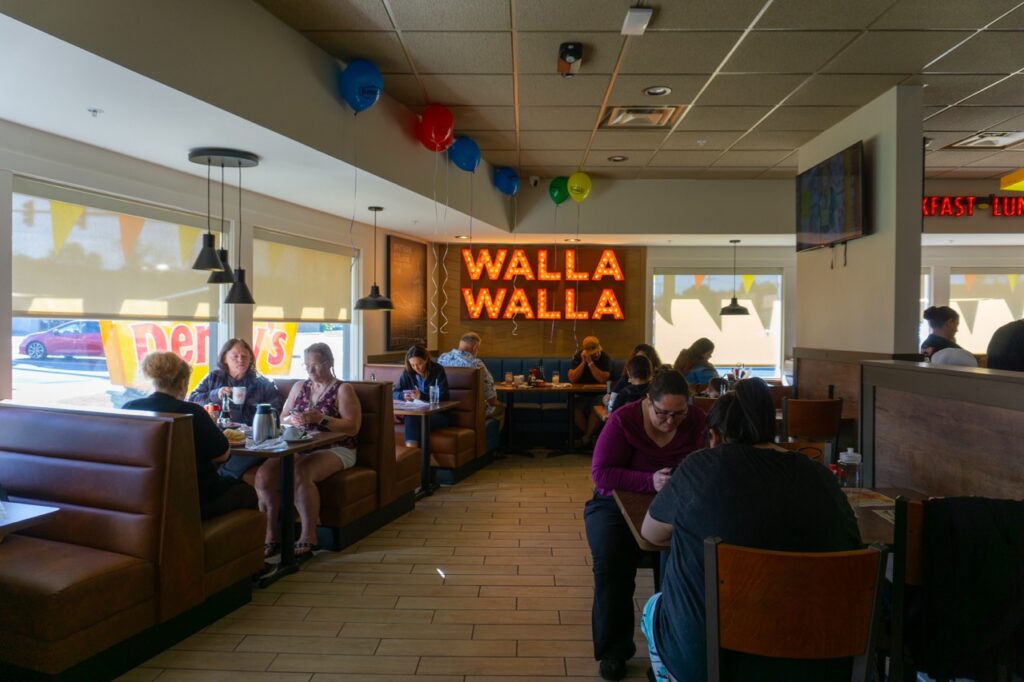
Walla Walla’s new Denny’s was full soon after opening on Tuesday, Oct. 1. (Credit: Susan Shain / NWPB)
Back in 2018, Washington “banned the box” for public and private employers, which means managers can’t ask about criminal records until later in the hiring process. Fifteen states and more than 20 municipalities have similar policies.
But second chances are still hard to come by: Nearly three-quarters of formerly incarcerated people are unemployed a year after their release.
Elizabeth Rice is chief strategic officer of the STAR Project, a local nonprofit that supports people transitioning out of incarceration. She said most employers aren’t eager to hire people with criminal records.
Rice wishes more companies prioritized second chance hiring. Doing so could make them eligible for tax breaks and other federal dollars.
It would also help people rebuild their lives after incarceration: Research suggests that stable employment makes it less likely that people will reoffend.
“Having a partnership with employers around the town, having partnerships with landlords, is really what allows us to start changing those stories for those individuals,” Rice said.
And changing those stories can benefit people, whether or not they have a connection with the justice system. “So much of what causes incarceration is desperation,” Rice said. “And if we can stop that from happening again post-release, then we’re making our community safer.”
When Rice learned that Denny’s was open to employees who were formerly incarcerated, she was thrilled. She met with the restaurant’s leadership to discuss the ins and outs of second chance hiring, such as being flexible if an employee has to miss work for probation or court, and communicating with case managers if individuals are showing up late or don’t have appropriate attire.
Ultimately, Rice sent about 25 STAR Project clients to the diner’s hiring fairs. She knows of at least five who accepted jobs.
Regardless of how many clients received offers, Rice said it was still a positive experience for them. It boosts an individual’s confidence, she said, “to feel really warmly welcomed and not see yourself being treated differently from other applicants.” In the future, Rice plans to send more job seekers to Denny’s. She also hopes to hold additional trainings for the diner’s managers.
“We are incredibly thankful every time we get to build a partnership like this,” she said. “Because that is what it’s going to take to make sure that we are having safer communities in the long run, that we are ending recidivism in the long run.”
Brian Predmore works for FEAST Enterprises, managing four Denny’s restaurants in Washington. He was one of the leaders who met with Rice, and he also did the diner’s hiring.
Predmore is a firm believer in second chances. “Everybody’s made a mistake in one way or another,” he said. “I have fallen down the, I call it, ‘the deep, dark tunnel’ a couple of times.”
Nearly two decades ago, for example, Predmore got two DUIs in a row. When he woke up in jail, he called his Denny’s manager. “She gave me that second chance,” he said. “And I haven’t taken a drink since.”

Some of the new staffers were referred to Denny’s through the STAR Project, a local reentry program. (Credit: Susan Shain / NWPB)
Predmore has now worked for Denny’s for more than 40 years. At all his restaurants, he tries to hire people whom others might overlook.
“These guys want that second chance,” he said. “They want to prove that they can fit in somewhere. And once you give them that, you’re giving them back life.”
For Thorpe, the line cook, that was certainly the case.
“A lot of people get caught up in stuff where they can’t break the cycle,” he said. “And I was one of the fortunate ones.”
When a company chooses not to hire someone with a record, Thorpe compared it to a parent continually punishing their child for a single mistake. “Every time you think about the thing that he did, you spank him,” he said. “It gets to the point somewhere in life: Are you going to ever stop spanking me?”
In the time he’s been away, Thorpe said a lot of things have changed at Denny’s: the menu, the technology, the pay. But the hiring process hasn’t.
“It means a lot to a convicted felon,” he said. “To where he can go and apply for a job and get a chance to just be a regular person.”
This week, Thorpe returned to the restaurant that looked at him like a regular person — and to the line that gave him life. He said it felt like coming home.

